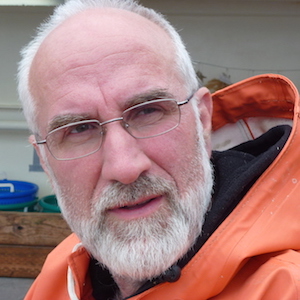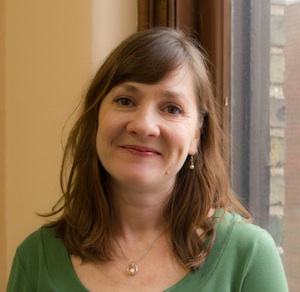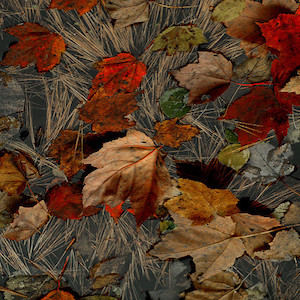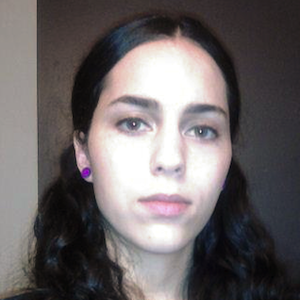The Story Behind “Though I Speak in Tongues of Ravens” by Peter Munro
Today’s post is written by Peter Munro. We published his poem “Though I Speak in Tongues of Ravens” in our Spring 2015 issue.
Crows, Ravens, and Keeping Faith
Crows season the poem “Though I Speak in Tongues of Ravens.” It is true that crows are salted in only minor murders. It is also true that their few numbers are diluted further among ravens. But still, by their murders, I faced a decision: to keep them or delete them. In a poem entitled with ravens, crows could be a glitch. A listener might shift away from a visceral, sensory experience to the intellect, might be distracted into a narrower, abstract puzzling of the presence of crows in a raven poem.
Where I grew up, a little fishing town in Southeast Alaska, crows and ravens commingled everywhere. They talked me to sleep in the long, summer dusk. Ravens chortled like monks punning with God, voices haunting the rain forest that shadowed my window screen. From the eaves of Sitka spruce, crows ratcheted discourses in survival of the fittest. Most deeply printed on me is a vision of the two species side by side, combing the beach, picking through the quick and the dead at low tide.
The decision was hard for me. Should I render the scene accurately to my experience or deliver the image by means that would better secure access for the listener? Either way, something felt at risk. The outcome would be uncertain and would vary from listener to listener. I had to have faith in the poem, in the listener, and finally in myself. Unsure which worked best, I kept the crows because I loved them.
Revising crows is of minor consequence. Who cares about the fretting of poets, here a comma, there a comma? But the example illustrates a more consequential challenge. I suggest that we, as humans, all operate by faith at some level. We experience ourselves as finite and small yet we must conduct our lives in a system that appears infinite in complexity and scale. Furthermore, beauty and ugliness exist side by side in this uncertain existence through which we pass. Sometimes loveliness gets swept away and we must struggle to hold on to whatever it is that gives our lives meaning. Sometimes injury or hate or terror damage our connection to whatever it is that we use to find joy. We must proceed in the face of uncertainty, which requires faith, whether we believe one doctrine or another doctrine, or suffer no doctrine at all. Though I’ve decked this poem with specific, sectarian trappings, I hope it reaches beyond narrow, sectarian bounds to inclusive notions of faith and living by faith.
Stewardship is how I think of it. We are each given a life, whether by random collision of particle or by the hand of some god. It doesn’t matter how, each of us has a life on our hands. Like it or not, we are stewards of that life. We can pursue joy or not. We can love or not. We may hope to shepherd our lives down paths of joy toward greater joy, yet we will almost surely pass through domains where dying and living are so close together we can’t tell them apart. When pain and fear commingle with joy, the good steward can only keep faith. I hope these rude verses provide a measure or two of solidarity with anyone nurturing the connection and flow between their beauty and other beauty.
Hard stewardship got this poem to Compose‘s pixels. Keeping faith wasn’t easy. The poem was written in 1990 or earlier. It was first submitted to journals in November 1991. Thirty-three journals rejected it thirty-four times (I forced one editor to refuse twice because I misread my records). More rejections would have mounted but for two weary periods in which I ran out of gas. For twenty-five years I fell in and out of love with the poem. I would come to detest the piece and yearn for a divorce. Then it would bonk me on the head with who I was and where I came from until I grieved old losses and refreshed the joy of assimilated beauties. By vision and revision, the poem grew and changed. I came to perceive it as a living thing, dynamic, even thriving. I was seeing myself, a living and dynamic being, perhaps even thriving, reflected in the mirror that any poem can be when approached with an open heart.
About Peter Munro
By day Peter Munro works as a fisheries scientist, on deck in the Bering Sea, the Gulf of Alaska, and the Aleutian Islands, or chained to a computer in Seattle. By night, Munro makes poems. Some have been published or are forthcoming in Poetry, the Beloit Poetry Journal, the Iowa Review, and elsewhere. More are forthcoming in the Birmingham Poetry Review, Passages North, The Cortland Review, The Valparaiso Poetry Review, and Rattle. Listen further at www.munropoetry.com.







